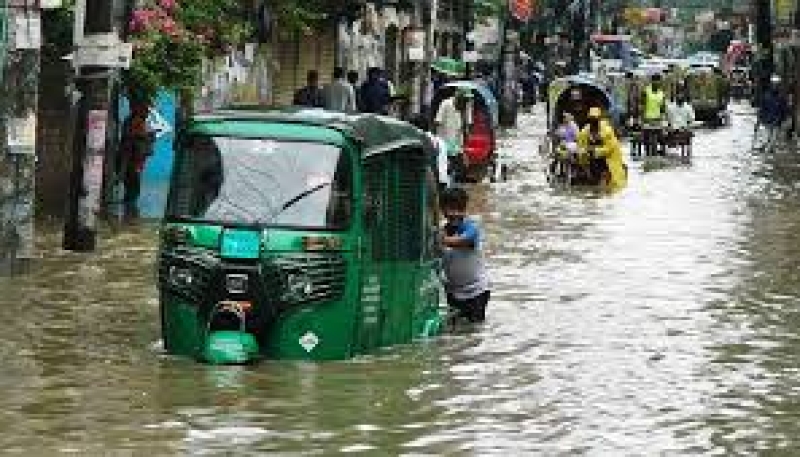- Protecting health demands no money: Bangladeshi expert |
- EU Deploys 56 Long-Term Observers Across Bangladesh |
- Appeals over nomination papers:18 more regain candidacies back |
- More than 100 dead in torrential rains and floods across southern Africa |
- Islami Andolan to Contest Election Alone in 13th Poll |
Addressing Dhaka City's Waterlogging Problem

Waterlogging in Dhaka City.
Dhaka, the bustling capital of Bangladesh with an estimated popolation of 25 million, faces a persistent challenge every monsoon season: waterlogging. This problem has deteriorated due to the rapid disappearance of natural water bodies that once served as crucial reservoirs for rainwater. As urbanization progressed and concrete spread, these vital water sources have been filled in or encroached upon, leaving Dhaka increasingly vulnerable to flooding and waterlogging.
The Disappearing Water Bodies
Historically, Dhaka was dotted with ponds, lakes, and marshlands that naturally absorbed excess rainwater during the monsoon. These water bodies acted as buffers, slowing down runoff and allowing water to percolate into the ground, thereby replenishing groundwater reserves. However, over the years, rapid urban development and population growth have led to the unsustainable filling in and building over of these water bodies.
Consequences of Waterlogging
The consequences of waterlogging in Dhaka are multifaceted:
• Traffic Disruption: Waterlogged streets cause traffic congestion, leading to significant delays and economic losses.
• Health Hazards: Stagnant water becomes breeding grounds for mosquitoes and other pests, increasing the risk of vector-borne diseases.
• Infrastructure Damage: Continuous exposure to water weakens roads, buildings, and utilities, necessitating frequent repairs and maintenance.
Potential Solutions
Addressing Dhaka's waterlogging issue requires a combination of short-term interventions and long-term planning:
• Reclamation and Restoration of Water Bodies:
• Immediate Action: Identify and reclaim illegally filled water bodies, ensuring strict enforcement of environmental regulations.
• Long-term Strategy: Develop comprehensive plans for the restoration and preservation of existing water bodies. Encourage community involvement in maintaining these areas.
• Improving Drainage Systems:
• Enhanced Maintenance: Regular cleaning and desilting of drains and canals to ensure smooth water flow.
• Modernization: Upgrade drainage infrastructure using advanced technologies to handle increased runoff efficiently.
• Promoting Green Infrastructure:
• Green Roofs and Rain Gardens: Encourage the installation of green roofs and rain gardens in buildings and public spaces to absorb rainwater.
• Permeable Pavements: Use permeable materials for pavements and parking lots to allow rainwater infiltration into the soil.
• Urban Planning and Policy Interventions:
• Zoning Regulations: Implement strict zoning laws to protect remaining water bodies from further encroachment.
• Incentives: Provide incentives for developers to incorporate sustainable drainage solutions in new construction projects.
Community Engagement and Awareness
Lastly, raising awareness among citizens about the causes and consequences of waterlogging is crucial. Engaging communities in sustainable water management practices and promoting rainwater harvesting at individual and community levels can significantly reduce the strain on urban drainage systems.
In conclusion, while Dhaka's waterlogging problem is complex and multifaceted, concerted efforts from government bodies, urban planners, and citizens can mitigate its impact. By prioritizing the restoration of natural water bodies, improving drainage infrastructure, promoting green solutions, and fostering community participation, Dhaka can build resilience against future monsoon seasons and ensure sustainable urban development.
Let's work together to reclaim Dhaka's lost water bodiess and secure a safer city for all its residents.

